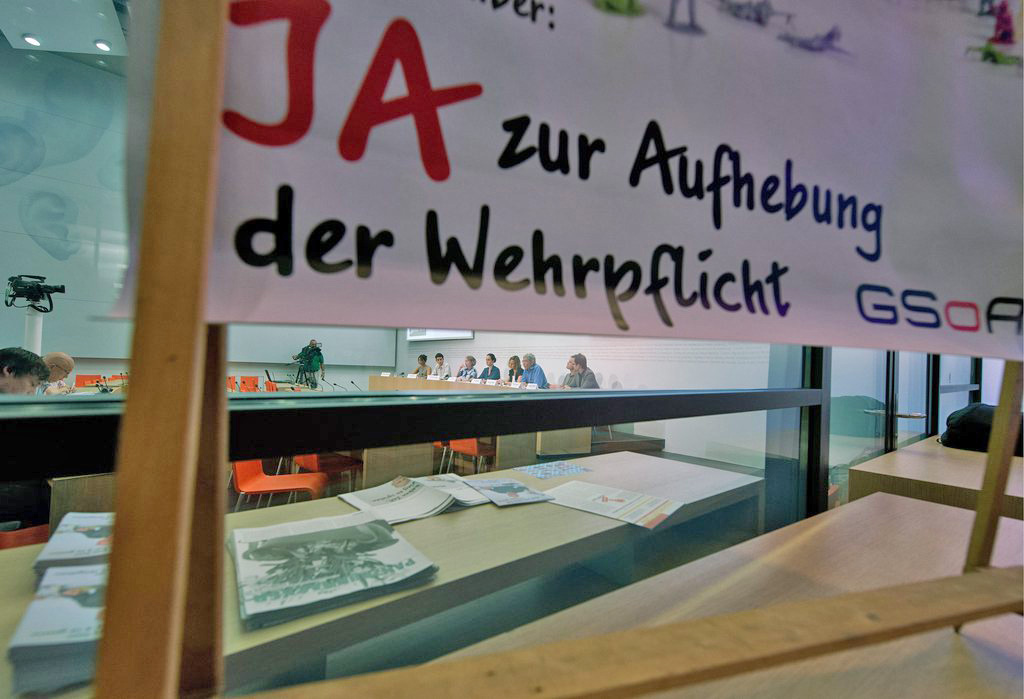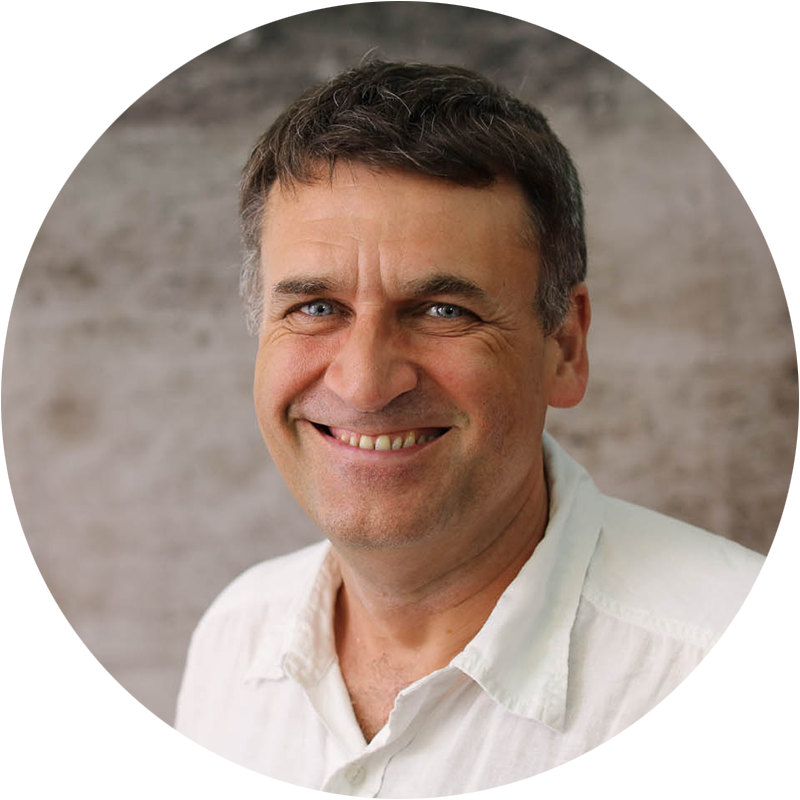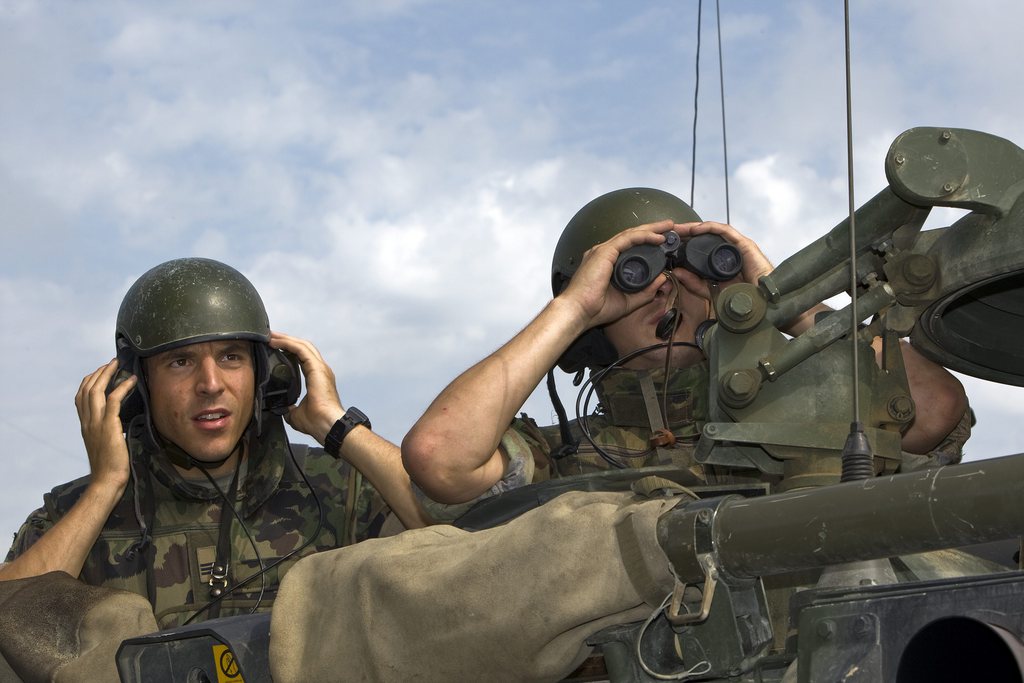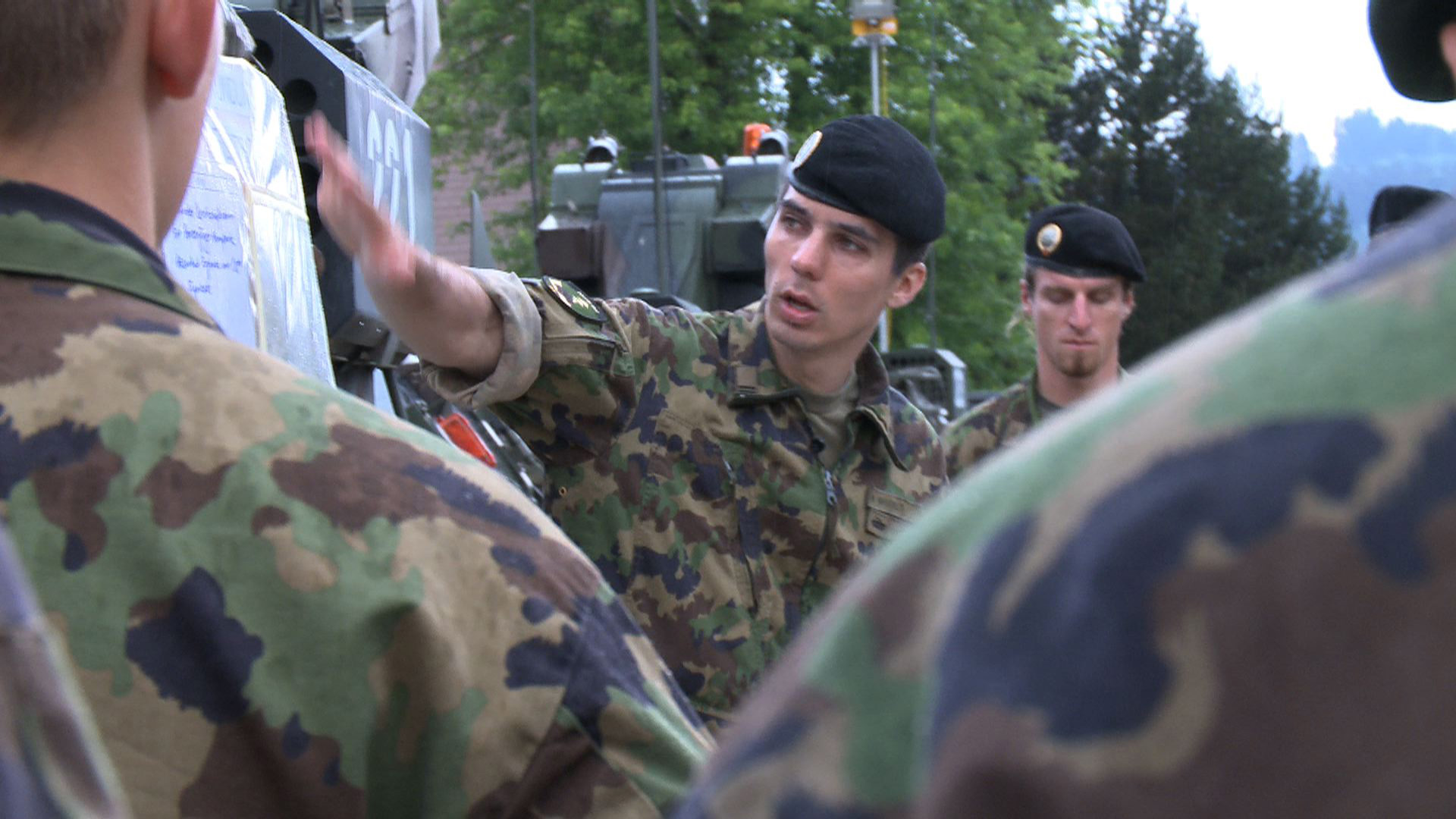‘No army’ brand proves a political handicap

The pacifist group Switzerland without an Army (GSoA) is not ready to quit despite a majority of voters rejecting its latest initiative to abolish conscription. But its poll defeat is enough for observers to openly question whether it should disband.
While there was little chance that conscription would be scrapped, no one could foresee the thumping defeat inflicted on the anti-army association last Sunday.
Almost three out of four voters came out against its initiative to end the draft and introduce a professional army of volunteers, compared to one-third of voters who supported doing away with the armed forces entirely in 1989.
“It was a tough vote and the result didn’t surprise us that much, even if we didn’t expect it to be as clear-cut,” said GSoA committee member Tobia Schnebli.
“On one side, our initiative was attacking an almost fundamental element of the Swiss identity; on the other the right and many army officers were against us because they were convinced that abolishing conscription practically meant the end of the armed forces.”
For the military historian and officer Dimitry Queloz, the result shows that most Swiss still want a credible army.
“The majority of voters probably also expressed the fact that they are fed up with pacifists coming back regularly with proposals aimed at weakening or abolishing the army,” he added.
Despite the GSoA’s resounding ballot box defeat, it is unlikely that the pace of reforms within the Swiss army will slow down.
“The armed forces is an institution that is being constantly reformed and adapted,” said Queloz. The army 95 and army XXI projects have seen Switzerland’s military might shrink considerably with far fewer soldiers and major structural adaptations.
Gross reckons reforms will most likely continue as the army has already instituted a number of them. Schnebli agrees, adding that its initiative garnered the most support among those directly concerned by conscription. “We can expect the pressure for change to remain at the same level,” he said.
Call it a day
For some politicians, the GSoA should be asking itself if it is time to call it a day. Queloz would be happy to see the association disband, but doesn’t believe this is likely to happen.
“Its members are convinced they are right,” he said. “It’s an extremist minority.”
Despite never convincing voters to accept one of its initiatives, the GSoA is certainly not ready to raise the white flag.
“We will continue,” warned Schnebli. “As one of my colleagues said, the cow is still sacred, but it’s not as fat as it was 20 years ago. Even if it is just skin and bone, the cow still eats up billions of francs.”
For the centre-left Social Democrat Andreas Gross, one of the group’s founders in 1982, the GSoA still has reasons to exist. From the very start, the association was not just aimed at abolishing the armed forces, but also at promoting peace.
“As far as peace is concerned, there is still plenty to do in Switzerland,” he added. Gross is no longer a member, having quit the association in 1997 over disagreements about whether to launch a second initiative against the army.
New identity
The Social Democrat reckons that the GSoA should consider changing its name to avoid its opponents presenting it as a tiny group obsessed with the army. “That way no one could doubt its legitimacy and its right to exist,” he added.
Schnebli said the organization might consider the idea, as it had done in the past.
“Personally, I think our goal of disarmament in Switzerland and elsewhere is still necessary, which is why I would prefer to keep our name,” he said.
Schnebli’s position was backed by another committee member, Adi Feller, in an interview with Zurich’s Tages-Anzeiger daily newspaper.
The name issue is likely to be highlighted again in the coming months. A referendum against the purchase of 22 Swedish Gripen fighter jets will be launched in the next weeks after parliament approved the acquisition.
The pacifist group Switzerland without an Army was founded in Solothurn in 1982. Besides calling for the abolition of the armed forces, another of its goals was to promote peace.
It launched its first initiative demanding an end to the army in 1986. It was rejected by 64 per cent of voters in 1989.
However, it convinced the government that reforms were necessary for an institution that could still count on a force of 700,000 men at the time. That figure has dropped to 155,000 today.
In 1992, the GSoA was able to collect over 500,000 signatures to stop the purchase of F/A 18 combat jets. The following year, 57.1 per cent of voters rejected the proposal.
In 2001, two other GSoA initiatives were rejected by three-quarters of voters, one calling for the abolition of the army, the other for the creation of a civilian service in favour of peace.
Besides launching its own initiatives, the group has also lent its support to other campaigns such as the one demanding stricter legislation for the purchase and ownership of guns, rejected by 56.3 per cent of voters in February 2011.
Gripen vote
Political parties on the left have already hinted they would prefer the GSoA to keep a low profile, preferring to avoid the vote turning into a ballot opposing those in favour or against the army.
For Gross, the Social Democratic Party would like to avoid past mistakes, especially since there could be a majority against the purchase.
“This isn’t because there is a majority who is anti-militarist and pacifist, but because most people are reasonable,” he said. “But if during the campaign the opponents can say it’s a vote against the army and security, reasonable people will begin to have their doubts.”
For Queloz, keeping the GSoA out of the picture is a clever move. “Without them involved in the campaign, you can say that you are against the purchase, not against the army,” he pointed out, “even if the abolition of the armed forces is still part of the Social Democratic Party’s programme.”
The GSoA does not intend to take a back seat during the campaign though.
“We are already preparing signature sheets for the referendum,” said Schnebli. “Once it is launched, we will start collecting signatures.”
“This time we won’t be alone, but I don’t see how anyone could win this vote without the participation of the anti-militarist and pacifist movements.”
Those movements and their supporters represent up to 20 per cent of voters if past army-related ballots are to be believed. So it’s a sure bet that the GSoA isn’t down to its last bullet.
(Adapted from French by Scott Capper)

In compliance with the JTI standards
More: SWI swissinfo.ch certified by the Journalism Trust Initiative












You can find an overview of ongoing debates with our journalists here . Please join us!
If you want to start a conversation about a topic raised in this article or want to report factual errors, email us at english@swissinfo.ch.